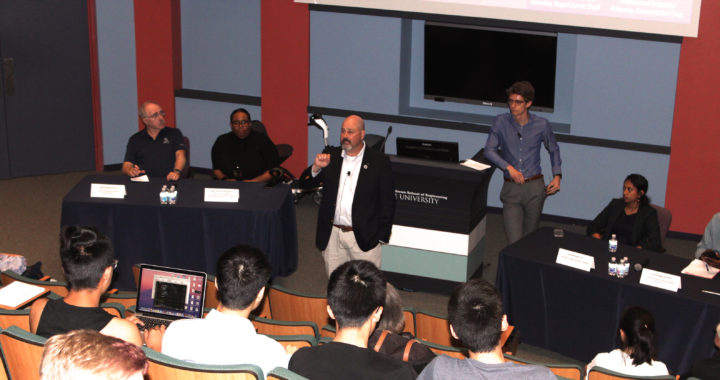The second RCEL Panel Discussion on Ethics and Leadership for Engineers brought more than 80 Rice students, faculty, and staff to McMurtry Auditorium on Monday, April 2.
“Our goal was to show students ethics through the eyes of professionals,” said RCEL Executive Director Kaz Karwowski. “It’s one thing to learn about ethics in a classroom, but another to face ethical decisions in the real world.”
The panel included C. Fred Higgs, III, PhD, Interim Vice Provost of Academic Affairs at Rice University and RCEL Faculty Director; Yvette Pearson, Ph.D., P.E., F.ASCE, Associate Dean for Accreditation & Assessment, George R. Brown School of Engineering; Sergio Kapusta ’81, ’06, Ph.D., Former Chief Materials Scientist of the Royal Dutch Shell; and Priya Prasad ’08, J.D., Intellectual Property (IP) Attorney, Exxon Mobil Corp. Each panelist brought a unique industry and perspective to the discussion. Constantine Tzouanas, junior, Bioengineering, moderated the discussion and posed various questions.
“I think I had previously assumed that as long as I was a good person I would make ethical decisions,” said Sage McAdams, sophomore, Electrical and Computer Engineering. “The panel made me realize ethical mistakes can happen even with the best intentions, so it is always important to keep ethics in the back of my mind.
“As engineers,” she continued, “we have a huge influence on what the future will look like, so it is important to consider the ethical implications of the projects we pursue in order to make sure our contributions will have a positive impact on the world.”
“I was very surprised to hear that all of the panelists could not only think of ethical dilemmas that they and their coworkers had faced,” said Alejandro Toscano Rodriquez, sophomore, Mechanical Engineering, “but that they could think of actual examples of ethical mistakes that they had made in the past and now regret. It really opened my eyes to how difficult it can be to always stick to ethics, and how difficult it can be to determine what is a “good” decision.”
A small reception followed the panel discussion, when students were able to talk to the panelists and ask additional questions.

